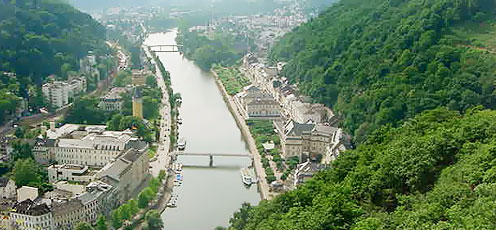2. Loveliness of Ems noted. I like to record these things.
3. p.157. "Her features were like those conceptions of Grecian sculptors which, in moments of despondency, we sometimes believe to be ideal."
4. Not much differentiation between characters, flow (flaw?) to (unintelligible word).
5. p. 174. Raptures on outing to Nassau Castle.
6. p. 203. Grey gets off from gambling trap(?) too easily. Not convincing.
7. p. 213. This is a picnic at the end of a long hike. No wonder so many servants were necessary.
8. p.217. White Anglo-Saxons dancing in the woods. Divine.
This picture came up in a search for "white anglo saxons dancing in the woods".
9. p. 227. This book starts to get weird--in a good way--at the castle where the Duke of Johannisberger breaks out the bottle of his namesake liquor. "'And now', continued the Grand Duke, 'having introduced you to all present, sir, we will begin drinking'".
10. Whenever I am reading one of these books and lament that I haven't acted in a situation as a 19th-century German aristocrat would, my wife explains with admirable rationality why we don't need to.
11. Is this a satire on aristocratic custom generally or just Germans? (Germans a popular subject of humor at this time).
12. p. 257. "...at your age, if, in fact, we study at all, we are fond of fancying ourselves moral philosophers, and our study is mankind. Trust me, my dear sir, it is a branch of research soon exhausted; and in a few years you will be very glad, for want of something else to do, to meditate upon stones." He goes on to encourage him to take up geology. "...for the geologist is the most satisfactory of antiquarians, the most interesting of philosophers, and the most inspired of prophets; demonstrating that which has passed by discovery, that which is occurring by observation, and that which is to come by induction." I used to wonder if geology were not one of my lost careers (i.e., something requiring some intelligence that I might have been able to do competently). It seemed like something I could have done when I was young, though everything is so complex and requires so much innovative and restless thinking to be able to contribute to it now that if I had gone into it I probably would not have been able to keep pace with ongoing developments and been obsolete by this point anyway.
13. p.264. I like Beckendorff's periodic sweeps of all 'philosophers' from the royal presence.
14. Sciolist: One who exhibits a pretentious attitude of scholarliness, superficial knowledgeability. I identified with the idea of this word.
15. p. 280. Beckendorff's Italy tip: "Well, then, when either of you go, you will, of course, not miss the Lago Maggiore. Gaze on Isola Bella at sunset, and you will not view so fair a scene as this!"
I have to confess, I don't have a lot to say with regard to the passing of Mandela, whom most thinking people have felt moved to pay their respects to over the past few days. I am not being a contrarian in this instance, I simply have not followed or studied his struggles and the progression of his life enough to have the strength of feeling for him such as other people seem to have. I am certainly persuaded by the general narrative and other superficial impressions that he was a superior and historically important man. I'm suspicious of the depth of sincerity and understanding of










